
Journal Menu
► ▼ Journal Menu-
- Electronics Home
- Aims & Scope
- Editorial Board
- Reviewer Board
- Topical Advisory Panel
- Instructions for Authors
- Special Issues
- Topics
- Sections & Collections
- Article Processing Charge
- Indexing & Archiving
- Editor’s Choice Articles
- Most Cited & Viewed
- Journal Statistics
- Journal History
- Journal Awards
- Society Collaborations
- Conferences
- Editorial Office
Journal Browser
► ▼ Journal BrowserNeed Help?
Announcements
9 May 2024
Meet Us at the 34th European Symposium on Computer Aided Process Engineering and the 15th International Symposium on Process Systems Engineering (ESCAPE34-PSE24), 2–6 June 2024, Florence, Italy

Conference: European Symposium on Computer Aided Process Engineering and International Symposium on Process Systems Engineering (ESCAPE34-PSE24)
Date: 2–6 June 2024
Location: Florence, Italy
ESCAPE34-PSE24 combines the 34th European Symposium on Computer-Aided Process Engineering and the 15th International Symposium on Process Systems Engineering (PSE). The keynotes, presentations and discussions will be delivered over 4 days and will cover the progress made in the broad range of the methodologies of the PSE toolkit, including AI, data analytics and digitalization, as well as their impactful application in the energy, food, healthcare, materials and sustainability fields.
The following MDPI journals will be represented:
- Processes;
- Electronics;
- Inventions;
- Technologies;
- Journal of Imaging;
- Modelling;
- Foundations;
- Computers.
Our delegates look forward to meeting you in person at the booth at the conference and answering any questions you may have. For more information regarding the conference, please visit the following link: https://www.aidic.it/escape34-pse24/index.php.
7 May 2024
Electronics | Highly Cited Papers in 2022 in the Section “Power Electronics”

Many forms of powered electronics can convert and control electricity: electrical drives and generators; renewable energy systems; energy storage systems; smart cities and grids; power systems; transport (vehicles, aircraft, ships, and others); industrial, medical, military, telecommunications, and consumable devices, and home apparatus.
“Power Electronics” Section is devoted to publishing original research and state-of-the-art review papers on the emerging technologies and trends in this field, including the components, circuits, design, modeling, simulation, control, implementation, testing, and analysis of power electronics and their applications.
As they are of an open access format, you have free and unlimited access to the full text of all of the articles published in our journal. We welcome you to read our most highly cited papers published in 2022 below.
1. “Hardware-in-the-Loop Simulations: A Historical Overview of Engineering Challenges”
by Franc Mihalič, Mitja Truntič and Alenka Hren
Electronics 2022, 11(15), 2462; https://doi.org/10.3390/electronics11152462
Available online: https://www.mdpi.com/2079-9292/11/15/2462
2. “A Review of Wireless Power Transfer Systems for Electric Vehicle Battery Charging with a Focus on Inductive Coupling”
by Iman Okasili, Ahmad Elkhateb and Timothy Littler
Electronics 2022, 11(9), 1355; https://doi.org/10.3390/electronics11091355
Available online: https://www.mdpi.com/2079-9292/11/9/1355
3. “A Survey on Capacitor Voltage Control in Neutral-Point-Clamped Multilevel Converters”
by Salvador Alepuz, Sergio Busquets-Monge, Joan Nicolás-Apruzzese, Àlber Filbà-Martínez, Josep Bordonau, Xibo Yuan and Samir Kouro
Electronics 2022, 11(4), 527; https://doi.org/10.3390/electronics11040527
Available online: https://www.mdpi.com/2079-9292/11/4/527
4. “Overview of Virtual Synchronous Generators: Existing Projects, Challenges, and Future Trends”
by Mohamed Abuagreb, Mohammed F. Allehyani and Brian K. Johnson
Electronics 2022, 11(18), 2843; https://doi.org/10.3390/electronics11182843
Available online: https://www.mdpi.com/2079-9292/11/18/2843
5. “A Review of the State of the Art of Industrial Microgrids Based on Renewable Energy”
by Daniel Gutiérrez-Oliva, Antonio Colmenar-Santos and Enrique Rosales-Asensio
Electronics 2022, 11(7), 1002; https://doi.org/10.3390/electronics11071002
Available online: https://www.mdpi.com/2079-9292/11/7/1002
6. “Progress on Second-Generation High-Temperature Superconductor Tape Targeting Resistive Fault Current Limiter Application”
by Jiamin Zhu, Sikan Chen and Zhijian Jin
Electronics 2022, 11(3), 297; https://doi.org/10.3390/electronics11030297
Available online: https://www.mdpi.com/2079-9292/11/3/297
7. “Multiple-Output DC–DC Converters: Applications and Solutions”
by Salvador P. Litrán, Eladio Durán, Jorge Semião and Cristian Díaz-Martín
Electronics 2022, 11(8), 1258; https://doi.org/10.3390/electronics11081258
Available online: https://www.mdpi.com/2079-9292/11/8/1258
8. “Stochastic Optimal Strategy for Power Management in Interconnected Multi-Microgrid Systems”
by Mahshid Javidsharifi, Hamoun Pourroshanfekr Arabani, Tamas Kerekes, Dezso Sera and Josep M. Guerrero
Electronics 2022, 11(9), 1424; https://doi.org/10.3390/electronics11091424
Available online: https://www.mdpi.com/2079-9292/11/9/1424
9. “A Novel Adaptive PID Controller Design for a PEM Fuel Cell Using Stochastic Gradient Descent with Momentum Enhanced by Whale Optimizer”
by Mohammed Yousri Silaa, Oscar Barambones and Aissa Bencherif
Electronics 2022, 11(16), 2610; https://doi.org/10.3390/electronics11162610
Available online: https://www.mdpi.com/2079-9292/11/16/2610
7 May 2024
Electronics | Highly Cited Papers in 2023 in the Section “Circuit and Signal Processing”

The “Circuits and Signal Processing” Section of Electronics (ISSN: 2079-9292) provides comprehensive coverage of all topics of interest in the field of circuits. The aim of the Section is to bring together researchers, engineers and students from academia and industry to present novel ideas and solid research on theoretical and practical aspects of circuits and signal processing applications.
As our journals are open access, you have free and unlimited access to the full text of all articles published in them. You are welcome to read the list of highly cited papers published in 2023 below:
1. “FPGA Implementation of a Chaotic Map with No Fixed Point”
by Claudio García-Grimaldo, Ciro Fabián Bermudez-Marquez, Esteban Tlelo-Cuautle and Eric Campos-Cantón
Electronics 2023, 12(2), 444; https://doi.org/10.3390/electronics12020444
Available online: https://www.mdpi.com/2079-9292/12/2/444
2. “CMOS-Based Memristor Emulator Circuits for Low-Power Edge-Computing Applications”
by Prosenjit Kumar Ghosh, Shah Zayed Riam, Md Sharif Ahmed and Prabha Sundaravadivel
Electronics 2023, 12(7), 1654; https://doi.org/10.3390/electronics12071654
Available online: https://www.mdpi.com/2079-9292/12/7/1654
3. “PSO-Based Target Localization and Tracking in Wireless Sensor Networks”
by Shu-Hung Lee, Chia-Hsin Cheng, Chien-Chih Lin and Yung-Fa Huang
Electronics 2023, 12(4), 905; https://doi.org/10.3390/electronics12040905
Available online: https://www.mdpi.com/2079-9292/12/4/905
4. “Comparative Performance of UPQC Control System Based on PI-GWO, Fractional Order Controllers, and Reinforcement Learning Agent”
by Marcel Nicola, Claudiu-Ionel Nicola, Dumitru Sacerdoțianu and Adrian Vintilă
Electronics 2023, 12(3), 494; https://doi.org/10.3390/electronics12030494
Available online: https://www.mdpi.com/2079-9292/12/3/494
5. “Distributed Deep Neural-Network-Based Middleware for Cyber-Attacks Detection in Smart IoT Ecosystem: A Novel Framework and Performance Evaluation Approach”
by Guru Bhandari, Andreas Lyth, Andrii Shalaginov and Tor-Morten Grønli
Electronics 2023, 12(2), 298; https://doi.org/10.3390/electronics12020298
Available online: https://www.mdpi.com/2079-9292/12/2/298
6. “Integrated Circuit Design of Fractional-Order Chaotic Systems Optimized by Metaheuristics”
by Martin Alejandro Valencia-Ponce, Astrid Maritza González-Zapata, Luis Gerardo de la Fraga, Carlos Sanchez-Lopez and Esteban Tlelo-Cuautle
Electronics 2023, 12(2), 413; https://doi.org/10.3390/electronics12020413
Available online: https://www.mdpi.com/2079-9292/12/2/413
7. “CMOS Widely Tunable Second-Order Gm-C Bandpass Filter for Multi-Sine Bioimpedance Analysis”
by Israel Corbacho, Juan M. Carrillo, José L. Ausín, Miguel Á. Domínguez, Raquel Pérez-Aloe and J. Francisco Duque-Carrillo
Electronics 2023, 12(6), 1326; https://doi.org/10.3390/electronics12061326
Available online: https://www.mdpi.com/2079-9292/12/6/1326
8. “Rethinking Liquid Crystal Tunable Phase Shifter Design with Inverted Microstrip Lines at 1–67 GHz by Dissipative Loss Analysis”
by Jinfeng Li
Electronics 2023, 12(2), 421; https://doi.org/10.3390/electronics12020421
Available online: https://www.mdpi.com/2079-9292/12/2/421
2 May 2024
MDPI Insights: The CEO's Letter #11 - 2023 Annual Report, MDPI Awards, STM

Welcome to the MDPI Insights: The CEO's Letter.
In these monthly letters, I will showcase two key aspects of our work at MDPI: our commitment to empowering researchers and our determination to facilitating open scientific exchange.
Opening Thoughts

2023 Annual Report
This is an exciting time of year at MDPI, as we have just released our annual report 2023, recapping the past year and sharing the progress and changes that took place during it.

Stefan Tochev (CEO, MDPI)
Reflecting on 2023, I can't help but think of the changes that have occurred not only at MDPI but also within our industry as a whole. In light of this, I’m reminded that change is the only constant, and that for a publishing enterprise that has experienced rapid growth, adapting to change becomes not only a necessity but also a catalyst for sustained success.
Looking back on the significant ground we covered in 2023, I am pleased to report that the year was marked by a rise in paper submissions, along with a range of initiatives aimed at improving our internal processes and delivering top services to our scientists.
2023 Top-line MDPI Numbers
An important priority for 2023 was to strengthen our editorial policies. Despite a notable increase in the number of papers submitted from 603,000 to 655,000 (+8.6%), there was a decrease in the number of papers published from 303,000 to 285,000 (-5.9%), consistent with the overall trend in the scholarly publishing market. MDPI’s market share in gold open access articles published reached 17% in 2023 (according to Dimensions data).
2023 Open Access Numbers
For over two decades, MDPI has been at the forefront of reshaping the academic publishing landscape, with OA surpassing subscription-based publishing in 2020. This trajectory is deeply rooted in our history and reflects our unwavering commitment to, and vision for, an open future. This momentum continued in 2023, with 39% of the 4.16 million articles and reviews published as gold full-OA, 15% as gold hybrid-OA, 8% as bronze-OA, and 3% as green-OA, relative to 35% behind a paywall. In terms of gold OA (full or hybrid) articles and reviews published, MDPI leads the way in terms of total articles published in 2023.
MDPI is the trusted and preferred OA publisher for the scholarly community
However, in 2023, we saw a downward trend in publication numbers compared to 2022. This trend was also seen in total OA publications. While the number of submissions increased, the decline in MDPI publications can be attributed to several factors, such as improved scrutiny in our peer-review process, including the evaluation of content scope and higher rejection rates, and a post-pandemic decrease in research related to COVID-19 papers.
Download 2023 MDPI Annual Report.
Access 2023 Digital Report.
Impactful Research

Recognizing Scholars – MDPI Awards
MDPI is committed to empowering young researchers as they embark on their careers. In 2023, our journals hosted a total of 400 awards, receiving 8,839 applications and nominations. The evaluation committees selected 959 winners, with the total budget for these awards amounting to CHF 546,500.
For more information about MDPI awards, applications, and winners, please click here
The following awards recognize scholars and the impact of their research, including Young Investigator Awards, Best PhD Thesis Awards, and Travel Awards for junior researchers.
MDPI Awards – The following awards require an application or a nomination.
Young Investigator Award (CHF 1000–2000 for each winner)
This award acknowledges the achievements of young investigators in research areas relevant to the journal’s scope. Candidates must have received their PhD no more than 10 years prior to the award announcement date and must be nominated.
Best PhD Thesis Award (CHF 500–800 for each winner)
This award recognizes young scholars who have completed outstanding PhD theses in research areas relevant to the journal’s scope. It aims to encourage them to continue their excellent work and make further contributions to their field.
Travel Award (CHF 500–800 for each winner)
This award encourages junior scientists to present their latest research at academic conferences relevant to the journal’s scope, thereby increasing their impact.
Distinguished Scholars
Additionally, 220 awards were granted to the most distinguished authors and reviewers in our journals through Best Paper Awards and Outstanding Reviewer Awards. The following awards are selected by the editorial staff of the journal and do not require an application or a nomination. They exemplify the excellent contributions made by our authors, reviewers, and editors.
These awards exemplify the excellent contributions made by our authors, reviewers, and editors
Best Paper Award (CHF 200–500 for each winner)
This award is granted annually to highlight publications of high quality, scientific significance, and extensive influence.
Outstanding Reviewer Award (CHF 500 for partial winners)
This award is given annually to recognize reviewers who generously contribute their time to reviewing papers and demonstrate thoroughness, professionalism, and timeliness in their reviews.
MDPI also offers awards for specific topics in various research fields:
Carbon Neutrality Award (CHF 500–800 for each winner)
Sponsored by MDPI journal Sustainability, this award recognizes applicants who have made exceptional academic or societal contributions to carbon neutrality, either in general or in relation to a specific carbon-neutrality-related issue.
Intelligent Manufacturing Award (CHF 500–800 for each winner)
Administered by MDPI journal Machines, this award is presented to an individual who has made outstanding academic or societal contributions to the field of intelligent manufacturing.
Granted: World Sustainability Awards
Inside MDPI

MDPI Opens Office in Seoul, Korea and Appoints Claude Seo as Office Manager
As CEO of the world’s leading OA publisher, I am pleased to announce the official opening of our Korean branch office. With this addition, MDPI now operates 21 offices in 12 countries worldwide, improving on our position as a truly global publisher. This expansion represents more than just an increase in our physical footprint; it is a pivotal step in our ongoing commitment to making scientific knowledge more accessible across the globe.
MDPI now operates 21 offices in 12 countries worldwide, improving on our position as a truly global publisher

Claude Seo (MDPI Korea Office Manager, Seoul)
Claude Seo, who has over 15 years of experience in the academic publishing industry, has been appointed as the Office Manager of the Seoul office. The launch of our Seoul office allows us to better support the Korean scientific community and to further promote the publication of OA journals in the region.
Reflecting on his role, Claude shared that he is:
“Delighted to have been entrusted with this position within MDPI, the no. 1 scholarly OA publisher. As we establish our presence in Korea, we are dedicated to integrating ourselves into the local community and contributing to its vibrant culture. Our commitment goes beyond business growth; it is about creating a more informed and innovative society by embracing and promoting diversity within the scientific community.”
Sungkyunkwan University Joins MDPI’s Institutional Open Access Program
Additionally, I am pleased to share that Sungkyunkwan University has joined MDPI’s Institutional Open Access Program (IOAP). This program offers free access to MDP’s online submission system for institutions and provides APC discounts to affiliated authors. Thirteen major Korean universities, including Sungkyunkwan University, Kyunghee University, Chung-Ang University, and the Catholic University of Korea, have adopted IOAP in Korea.
Learn more about MDPI’s collaboration in Korea in my previous CEO Letter, in which I recap our visit to Seoul, South Korea.
Coming Together for Science

4th MMCS: Harnessing the Power of New Drug Modalities
Our conference team successfully managed the 4th Molecules Medicinal Chemistry Symposium, held from 24–26 April in Barcelona, Spain. It was chaired by Prof. Dr. Diego Muñoz-Torrero from the Institute of Biomedicine (IBUB), University of Barcelona, Spain, and Prof. Dr. Simona Collina from the University of Pavia, Italy. In total, there were 84 accepted abstracts and 102 conference attendees from 22 different countries.
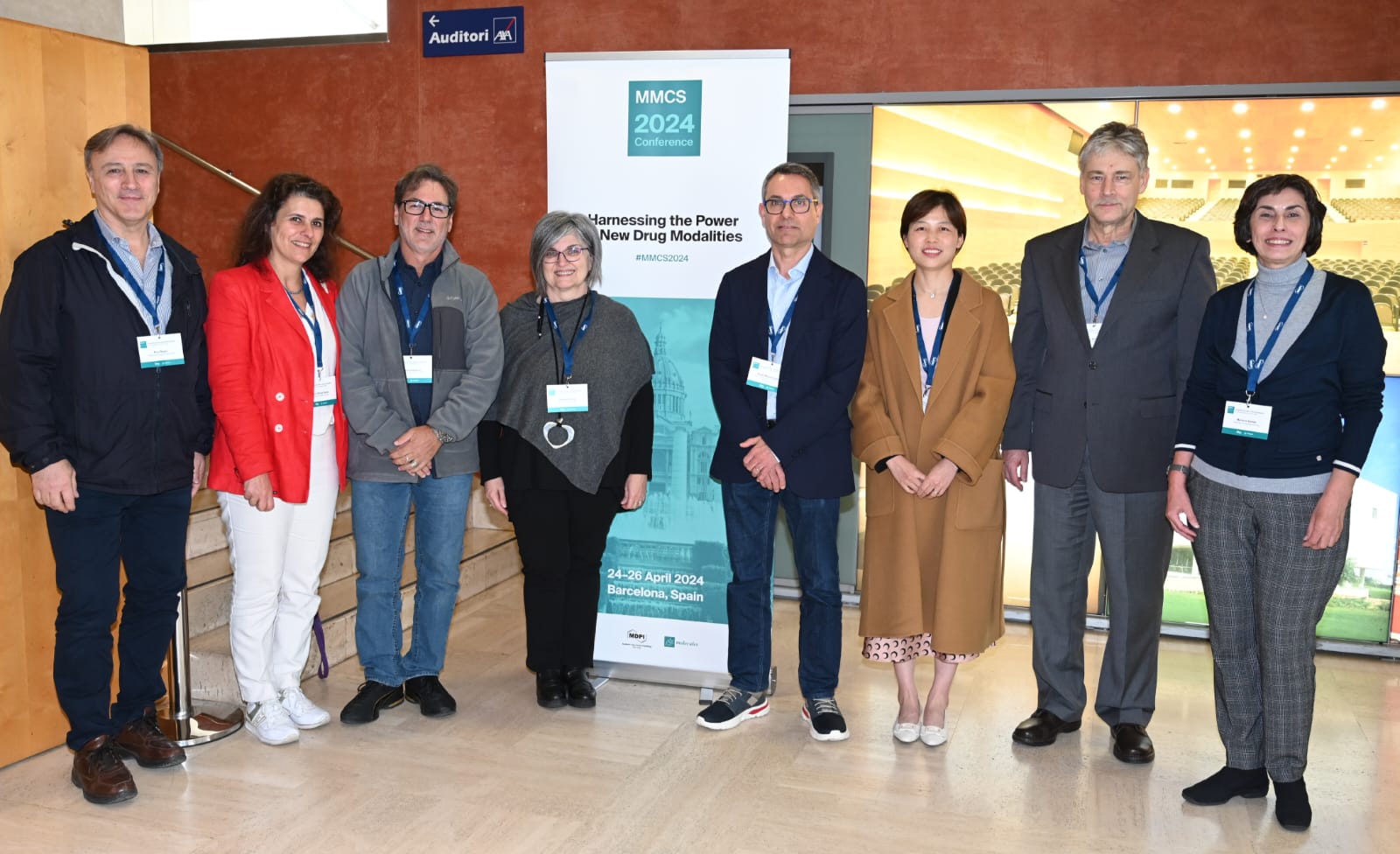
From left to right: Prof. Dr. Rino Ragno (Scientific Committee), Dr. Maria Emilia Sousa (Scientific Committee), Prof. Dr. Claudio Viegas Jr. (Scientific Committee), Prof. Dr. Simona Collina (Chair), Prof. Dr. Diego Muñoz-Torrero (Chair), Alvina Wu (Managing Editor, MDPI), Prof. Dr. Roman Dembinski (Scientific Committee), Prof. Dr. Mariana Spetea (Scientific Committee).
The event comprised 12 Invited Speakers, 35 Selected Talks, 10 Flash Poster Presentations, and 39 Posters. The overarching topic of the conference was the impact of the emergence of new drug modalities on drug discovery, with thematic sessions covering topics such as photoactivatable drugs, candidates targeting RNA and epigenetic targets, covalent modifiers, and the development of new anti-cancer agents, among other medicinal chemistry projects.
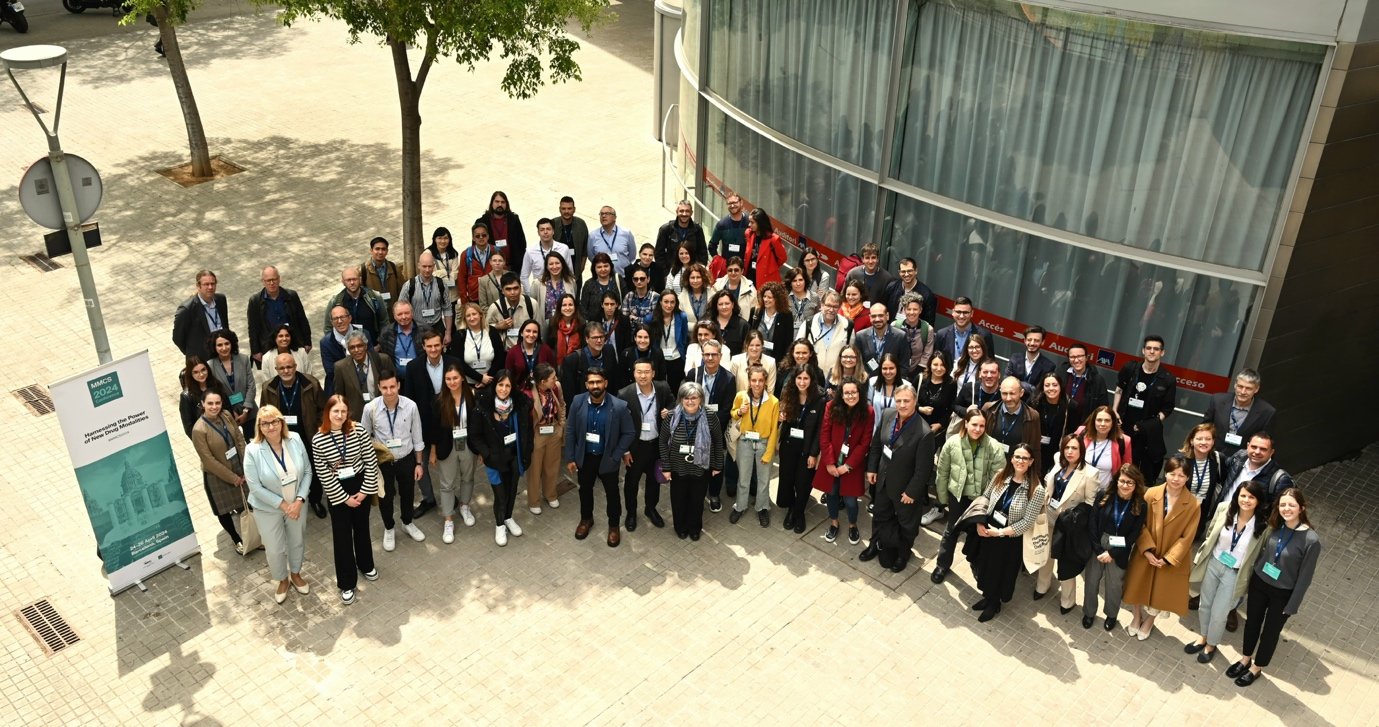
We are pleased to have received feedback from attendees highlighting the professional approach of the conference chairs and participants, the high quality of the talks, and the overall outstanding organization on the part of the MDPI conference team.
Thank you to the conference sponsors, Fluorochem and IBUB, and to our partnering societies, The Spanish Society for Biochemistry and Molecular Biology (SEBBM), and the Spanish Society of Medicinal Chemistry (SEQT).
Upcoming In-Person Event
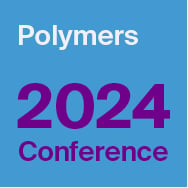
28–31 May, 2024
Polymers 2024 – Polymers for a Safe and Sustainable Future
Location: Athens, Greece
Conference Chairs: Prof. Dr. Dimitrios Bikiaris, Prof. Dr. Konstantinos Triantafyllidis, Dr. Ioanna Deligkiozi
We look forward to welcoming experts Prof. Damià Barceló, Prof. Minna Hakkareinen, and Prof. Armando J. D. Silvestre to this event.
Find more upcoming MDPI events here.
Organize Your Event with MDPI’s Sciforum
Sciforum is MDPI’s platform dedicated to the organization of scientific events. In line with our mission to promote science, Sciforum supports scholars, societies, research networks, and universities at all stages of organizing in-person events, virtual events and webinars. Our platforms are efficient, user-friendly, and cost-effective. We handle all steps related to event management. Contact us for details.
Closing Thoughts
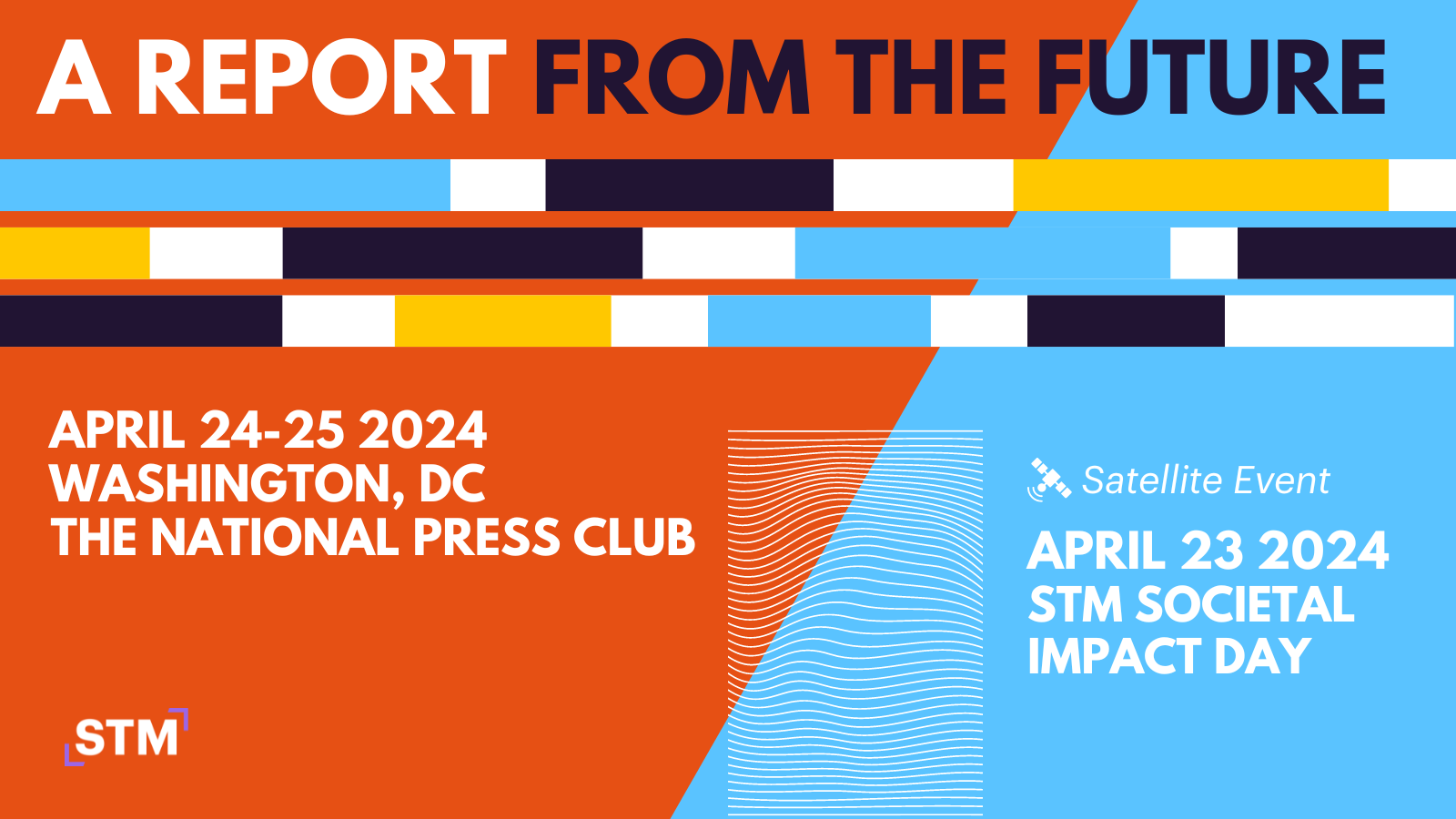
A Report from the Future – STM US Annual Conference 2024
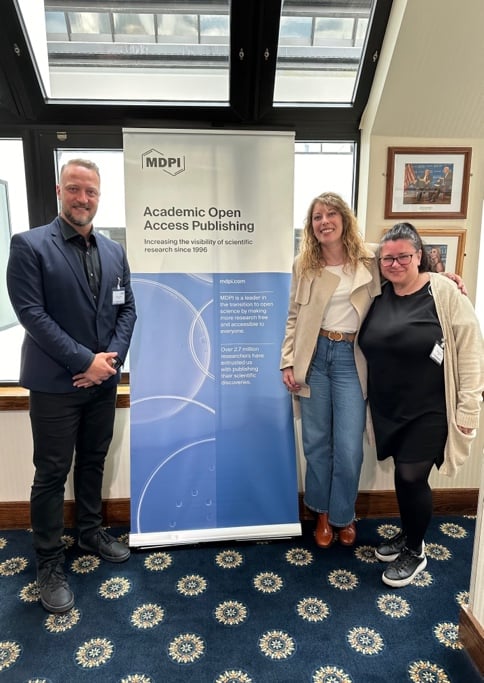
Stefan Tochev (CEO, MDPI), Dr. Giulia Stefenelli and Dr. Ioana Craciun from MDPI’s Scientific Office Board.
MDPI has for a long time been a sponsor of the STM Annual Conferences, held yearly in the US and Frankfurt, and is a trusted partner and supporter of the STM organization. While I have attended the Frankfurt conference for the past three years, this was my first time visiting the Washington, DC session, and I am glad I did.
Although it was a brief trip, I greatly appreciated the opportunity to attend in the company of my colleagues Dr. Giulia Stefenelli and Dr. Ioana Craciun from MDPI’s Scientific Office Board. They always help map some of the new industry trends against MDPI’s operational framework and guidelines. It’s a great group for kicking ideas back and forth on what we can apply at MDPI.
In my experience, STM never fails to deliver. It’s always a great conference for reconnecting with fellow publishers, industry friends, and vendors. As usual, STM this year curated a diverse range of speakers and panels, who proferred valuable knowledge and insights from outside our industry, delivering thought-provoking insights into our field. An example of this was the ‘Trust Panel’ session, which included Alan Schiffres (Managing Director, InfoLinx), who shared a number of the learnings about fraud and risk management from his 40 years in financial services, to help address some of the challenges we are currently facing in the area of publishing integrity.
Launch of STM Trends 2028 Panel
I particularly enjoyed the ‘Launch of STM Trends 2028 Panel’, which presented a report focused on the integration of humans and machines in scholarly publishing. The session highlighted themes such as AI, digitization, and the evolving research ecosystem. The report envisions a future where technology blurs the lines between human and machine involvement in research processes, with significant implications for trust, reputation, and equity. While this presents opportunities for connectivity and knowledge dissemination, it also poses challenges such as disinformation, fragmentation, and geopolitical tensions. We must rely on a wise combination of technology and human agency to navigate this complex landscape and will have to carefully examine its potential impacts on communication and scholarly publishing.
MDPI has joined the STM Integrity Hub. Click here to learn more.
While every presenter brought their own knowledge and personal touch, I was particularly pleased to encounter new speakers such as Heather Whitney (Research Assistant Professor, Radiology, University of Chicago) and Igor Grossmann (Professor of Psychology, University of Waterloo, Canada). Having studied Sociology at the University of Guelph, I have a soft spot for fellow social scientists from Canada, and I was very impressed by Igor’s presentation on ‘The Social Scientist: A View from the Future’ and his participation in the panel session ‘The Future Beyond the Article,’ which was one of my favourites from the conference, given the diversity of perspectives from the panel speakers.
Memorial Park in Washington, DC

On a personal note, this was my first-time visiting Washington, DC, and I’m glad we took an afternoon to visit the Memorial Park, with its incredible monuments to figures ranging from Martin Luther King, Jr. to Abraham Lincoln. The magnitude of the monuments is deeply impressive. I particularly appreciated the Thomas Jefferson memorial and the following quote, which I think speaks to the importance of change and adaptation. It’s something we can apply not only in our industry but also in our personal lives.
"I am not an advocate for frequent changes in laws and constitutions, but laws and institutions must go hand in hand with the progress of the human mind. As that becomes more developed, more enlightened, as new discoveries are made, new truths discovered and manners and opinions change, with the change of circumstances, institutions must advance also to keep pace with the times. We might as well require a man to wear still the coat which fitted him when a boy as a civilized society to remain ever under the regimen of their barbarous ancestors."
– Excerpted from a letter to Samuel Kercheval, July 12, 1816.
Chief Executive Officer
MDPI AG
30 April 2024
MDPI Opens Office in Seoul, Korea and Appoints Claude Seo as Office Manager

MDPI, the leading Open Access (OA) publisher, announced on Monday that it opened its Korean branch office on 29th April 2024. With this addition, MDPI now operates 21 offices in 12 countries worldwide. Claude Seo, with over 20 years of experience in the academic journal publishing industry, including Nature Publishing Group (NPG), has been appointed as the Office Manager of the Seoul office.
With the establishment of a Seoul office, MDPI aims to actively support Korea scientific communities to further promote the publication of OA journals in the region. As of the end of 2023, Korea ranked sixth worldwide in both submissions and publications of MDPI research papers. MDPI is the number one OA publisher in Korea.
Sungkyunkwan University Joins MDPI’s Institutional Open Access Program
In addition, MDPI announced that Sungkyunkwan University joined MDPI’s Institutional Open Access Program (IOAP). This program offers free access to MDPI online submission system for the institutions and APC discounts to affiliated authors. Thirteen major Korean universities, including Sungkyunkwan University, Kyung Hee University, Chung-Ang University and Catholic University of Korea, have adopted IOAP in Korea.
OA aims to break down barriers that have traditionally restricted access to science, ensuring that knowledge is available to all, regardless of financial situation or institutional affiliations. Authors, academia, and scientific communities are rapidly moving toward OA. MDPI has been at the forefront of reshaping the academic publishing landscape, with OA surpassing subscription-based publishing in 2020.
MDPI CEO Visits Seoul, Korea
In March, Stefan Tochev, Chief Executive Officer (CEO) of MDPI, visited Korea and met with various stakeholders including government agencies, research and academic institutions, universities. During his visit, Stefan highlighted that MDPI continues to pave the way for a world where science is accessible to all, supporting a global community of inclusive innovation and collaborative solutions.
Stefan expressed excitement about the new venture, stating, "Today marks a significant milestone for MDPI as we celebrate the opening of our new office in Seoul, Korea. This expansion is more than just an increase in our physical footprint, it is a pivotal step in our ongoing commitment to making scientific knowledge more accessible, participatory, and inclusive across the globe."
Claude Seo, reflecting on his new role, commented, "I am delighted to have been offered this position of trust within MDPI, the no. 1 scholarly OA publisher. As we establish our presence in Korea, we are dedicated to integrating into the local community and contributing to its vibrant culture. Our commitment goes beyond business growth; it is about creating a more informed and innovative society by embracing and promoting diversity within the scientific community.”
For further inquiries, please contact our Seoul office directly.
About MDPI
A pioneer in scholarly, open access publishing, MDPI has supported academic communities since 1996. MDPI is leading the transition to open science by making more research free and accessible to everyone. Over 3.3 million researchers have entrusted MDPI with publishing their scientific discoveries. MDPI’s editorial process is bolstered by a network of dedicated reviewers, a team of 6000 diligent, well-trained staff members, and an in-house article submission platform that was designed to ensure efficient processes within its 430 fully OA titles.
26 April 2024
Interview with Dr. Riccardo Mandrioli—Winner of Electronics 2023 Best Ph.D. Thesis Award

We are pleased to announce the winner of the Electronics 2023 Best Ph.D. Thesis Award. This award is for a Ph.D. student or recently qualified researcher who has produced a highly anticipated thesis with impressive academic potential.
The award has been granted to “Analysis and Improvements of Four-Wire Power Converters for Electric Vehicle Chargers” by Dr. Riccardo Mandrioli, University of Bologna, Italy.
The winner will receive CHF 800, a certificate, and a chance to publish a paper free of charge after peer review in Electronics (ISSN: 2079-9292) in 2024.
We congratulate Dr. Riccardo Mandrioli on his accomplishments. We would like to take this opportunity to thank all the applicants for submitting their exceptional theses and the Award Committee for voting for and supporting this award.
Dr. Riccardo Mandrioli is currently a Tenure Track Assistant Professor (RTT) for the academic discipline ING-IND/31, Electrical Engineering, with the Department of Electrical, Electronic, and Information Engineering, University of Bologna. From November 2022 to January 2024, he was a Postdoctoral Research Fellow and Adjunct Professor, and he has also been involved as a Teaching Assistant for multiple engineering courses since 2017. In November 2023, he received the National Scientific Habilitation (ASN) for the permanent position of Associate Professor in the academic recruitment fields 09/E1, Electrical Engineering.
The following is an interview with Dr. Riccardo Mandrioli:
1. Could you please give us a brief overview of your research topic and the main objectives of your Ph.D. thesis?
Since my Ph.D. thesis I have focused on power electronic converters for charging electric vehicles (EVs) with particular reference to onboard chargers (OBC). EV chargers usually consist of two parts, active front end and isolated back end. In this way, I could focus both on AC/DC and DC/DC converters, therefore rectification and regulation of the voltage. In this field, the first works I published in MDPI were focused on four-wire inverters, because they were not studied at that time. The idea was to firstly study analytically the harmonic behavior of these converters and provide an easy and precise description that could be used by other researchers, and secondly, technical proposals capable of ensuring new improvements based on this analysis were made.
2. What motivated you to pursue this research topic, and how did you formulate your research questions?
The main motivation was connected to the benefits related to the green shift and transportation electrification. I haven’t developed a full knowledge of every aspect of electric vehicles which were already starting to boom in 2019, the year when I started my Ph.D., in fact, I wanted to focus specifically on the power electronics converters for this application. Additionally, the public body that founded my scholarship also wanted me to focus on smart power converters for electric vehicle charging.
3. How did you manage your time and prioritize your tasks during your Ph.D. program, and what strategies did you use to stay focused and motivated?
When I started my Ph.D., I and the other authors managed to submit a conference paper without experimental results. Afterwards, the lockdown closed us down and we had to stop with the experimental part, but we continued with the research and simulation remotely. In doing so we had set the base for the research for the next 2 years. After the lockdown we could proceed with the experimental work, in a few weeks we could validate what we did during the lockdown, and then we put together many papers and kept on developing the topic of four-wire inverters. The second part of my Ph.D. thesis, dealing with isolated back end, is related with the activities conducted during my 6-month visiting period at the Chair of Power Electronics at the University of Kiel in Germany under the supervision of Prof. Marco Liserre.
4. What were some of the biggest challenges you faced during your Ph.D. journey, and how did you overcome them?
The biggest challenges were mainly related to understanding what we could accomplish with our studies. As I said electric vehicle charging was booming in 2019, in fact, the topic was not entirely new and other studies were conducted around it. We didn't know if our work could cover any meaningful gap. However, with the help of my supervisor Prof. Gabriele Grandi and co-supervisor Prof. Mattia Ricco, I understood that we had the skills to fill in the gap related to harmonic analysis and optimization. So, this was the most difficult part, the beginning.
5. When and how did you discover Electronics? What prompted you to apply for this award, and what has your experience been like with Electronics?
I always had a good collaboration with Electronics and other MDPI journals in general. Regarding the award, I wanted to apply, because I knew the topic could be suitable for this award. As far as I know, other colleagues tried as well here at the University of Bologna. Ph.D. students and professors are aware of this award.
6. Finally, how do you plan to continue building on your research in the future, and what are your long-term career aspirations?
After the Ph.D., I was engaged in one year of post-doctoral research as a research fellow and adjunct professor and now I am officially a faculty member as a tenure-track assistant professor at the University of Bologna. Now, with other professors and our research group of 10 Ph.D. students, we want to shift our study to other aspects and gaps of power electronics like modularity, partial power processing, and reliability.
25 April 2024
Electronics | Highly Cited Papers in 2023 in the Section “Artificial Intelligence”

The “Artificial Intelligence” Section of the journal Electronics (ISSN: 2079-9292) mainly covers topics of interest within unique hardware-based deep learning AI and algorithmic deep learning AI using machine learning. The purpose of this Section is to bring together researchers and engineers, from both academia and industry, to present novel ideas and solid research on the hardware and algorithmic aspects of advanced applications of deep learning-based AI.
As all of the articles published in our journal are in an open access format, you have free and unlimited access to the full texts. We welcome you to read our most highly cited papers published in 2023 listed below:
1. “Deep Learning-Based Attack Detection and Classification in Android Devices”
by Alfonso Gómez and Antonio Muñoz
Electronics 2023, 12(15), 3253; https://doi.org/10.3390/electronics12153253
Available online: https://www.mdpi.com/2079-9292/12/15/3253
2. “An Empirical Survey on Explainable AI Technologies: Recent Trends, Use-Cases, and Categories from Technical and Application Perspectives”
by Mohammad Nagahisarchoghaei, Nasheen Nur, Logan Cummins, Nashtarin Nur, Mirhossein Mousavi Karimi, Shreya Nandanwar, Siddhartha Bhattacharyya and Shahram Rahimi
Electronics 2023, 12(5), 1092; https://doi.org/10.3390/electronics12051092
Available online: https://www.mdpi.com/2079-9292/12/5/1092
3. “Robust and Lightweight Deep Learning Model for Industrial Fault Diagnosis in Low-Quality and Noisy Data”
by Jaegwang Shin and Suan Lee
Electronics 2023, 12(2), 409; https://doi.org/10.3390/electronics12020409
Available online: https://www.mdpi.com/2079-9292/12/2/409
4. “Rotor Fault Diagnosis Method Using CNN-Based Transfer Learning with 2D Sound Spectrogram Analysis”
by Haiyoung Jung, Sugi Choi and Bohee Lee
Electronics 2023, 12(3), 480; https://doi.org/10.3390/electronics12030480
Available online: https://www.mdpi.com/2079-9292/12/3/480
5. “Experimental Machine Learning Approach for Optical Turbulence and FSO Outage Performance Modeling”
by Antonios Lionis, Antonios Sklavounos, Argyris Stassinakis, Keith Cohn, Andreas Tsigopoulos, Kostas Peppas, Konstantinos Aidinis and Hector Nistazakis
Electronics 2023, 12(3), 506; https://doi.org/10.3390/electronics12030506
Available online: https://www.mdpi.com/2079-9292/12/3/506
6. “An Efficient Adaptive Noise Removal Filter on Range Images for LiDAR Point Clouds”
by Minh-Hai Le, Ching-Hwa Cheng and Don-Gey Liu
Electronics 2023, 12(9), 2150; https://doi.org/10.3390/electronics12092150
Available online: https://www.mdpi.com/2079-9292/12/9/2150
7. “Fuzzy Rough Nearest Neighbour Methods for Aspect-Based Sentiment Analysis”
by Olha Kaminska, Chris Cornelis and Veronique Hoste
Electronics 2023, 12(5), 1088; https://doi.org/10.3390/electronics12051088
Available online: https://www.mdpi.com/2079-9292/12/5/1088
8. “Towards Deploying DNN Models on Edge for Predictive Maintenance Applications”
by Rick Pandey, Sebastian Uziel, Tino Hutschenreuther and Silvia Krug
Electronics 2023, 12(3), 639; https://doi.org/10.3390/electronics12030639
Available online: https://www.mdpi.com/2079-9292/12/3/639
9. “LLM-Informed Multi-Armed Bandit Strategies for Non-Stationary Environments”
by J. De Curtò, I. de Zarzà de Curtò, Gemma Roig, Juan Carlos Cano, Pietro Manzoni and Carlos T. Calafate
Electronics 2023, 12(13), 2814; https://doi.org/10.3390/electronics12132814
Available online: https://www.mdpi.com/2079-9292/12/13/2814
10. “Intelligent Decision Support for Energy Management: A Methodology for Tailored Explainability of Artificial Intelligence Analytics”
by Dimitrios P. Panagoulias, Elissaios Sarmas, Vangelis Marinakis, Maria Virvou, George A. Tsihrintzis and Haris Doukas
Electronics 2023, 12(21), 4430; https://doi.org/10.3390/electronics12214430
Available online: https://www.mdpi.com/2079-9292/12/21/4430
15 April 2024
Electronics 2024 Best Paper Award—Winners Announced
We are pleased to announce the winners of the Electronics 2024 Best Paper Award. All papers published in 2022 in Electronics (ISSN: 2079-9292) were considered for the award. After a thorough evaluation of the originality and significance of the papers, citations, and downloads, three winners were selected.
One Review:
“A Review of Wireless Power Transfer Systems for Electric Vehicle Battery Charging with a Focus on Inductive Coupling”
by Iman Okasili, Ahmad Elkhateb and Timothy Littler
Electronics 2022, 11(9), 1355; https://doi.org/10.3390/electronics11091355
Available online: https://www.mdpi.com/2079-9292/11/9/1355
Two Research Articles:
“A Deep Learning Model for Network Intrusion Detection with Imbalanced Data”
by Yanfang Fu, Yishuai Du, Zijian Cao, Qiang Li and Wei Xiang
Electronics 2022, 11(6), 898; https://doi.org/10.3390/electronics11060898
Available online: https://www.mdpi.com/2079-9292/11/6/898
“Machine Learning for DDoS Attack Detection in Industry 4.0 CPPSs”
by Firooz B. Saghezchi, Georgios Mantas, Manuel A. Violas, A. Manuel de Oliveira Duarte and Jonathan Rodriguez
Electronics 2022, 11(4), 602; https://doi.org/10.3390/electronics11040602
Available online: https://www.mdpi.com/2079-9292/11/4/602
Each winner will receive CHF 500, a chance to publish a paper free of charge in Electronics in 2024 after peer review, and a certificate.
Please join us in congratulating the winners of the Electronics 2024 Best Paper Award. We would also like to take this opportunity to thank all of our authors for their continued support of Electronics.
This announcement is delivered on behalf of the Assessment Committee—Prof. Dr. Flavio Canavero, Dr. Kostas Karpouzis, Prof. Dr. Manuel Arrebola, and Prof. Dr. Jingyang Fang.
Electronics Editorial Office
15 April 2024
Electronics 2023 Best Ph.D. Thesis Award—Winners Announced

We are pleased to announce the winners of the Electronics 2023 Best Ph.D. Thesis Award. This award is for two Ph.D. students or recently qualified Ph.D.’s who have produced a highly anticipated thesis with great academic potential.
The award has been granted to the following:
“Hardware-friendly Low-bit Quantization for Neural Network Compression”
by Dr. Haotong Qin, Beihang University, China
“Analysis and Improvements of Four-Wire Power Converters for Electric Vehicle Chargers”
by Dr. Riccardo Mandrioli, University of Bologna, Italy
Each winner will receive CHF 800, a certificate, and a chance to publish a paper free of charge after peer review in Electronics (ISSN: 2079-9292) in 2024.
On behalf of the evaluation committee—Prof. Dr. George A Tsihrintzis, Prof. Dr. Francisco Falcone, Prof. Dr. Xiongfeng Ma, and Prof. Dr. Giulio Antonini—we congratulate the winners on their accomplishments. We would like to take this opportunity to thank all the applicants for submitting their exceptional theses and thank the Award Committee for voting and helping with this award.
Prof. Dr. Flavio Canavero
Editor-in-Chief of Electronics
12 April 2024
Meet Us at the ISPRS TC I Mid-term Symposium on Intelligent Sensing and Remote Sensing Application (ISPRS 2024 TC I), 13–17 May 2024, Changsha, China

MDPI will be attending the ISPRS TC I Mid-term Symposium on Intelligent Sensing and Remote Sensing Application 2024 in Changsha, China, which will take place from the 13 to 17 May 2024. Centering around the research areas of TC I and its subordinate working groups, the symposium includes plenary sessions, technical sessions, paper posters, technology exhibitions, and technical visits. If you are attending the conference, please visit our booth. Our delegates look forward to meeting you in person and answering any questions you may have.
The following MDPI journals will be represented at the conference:
- IJGI;
- Remote Sensing;
- Electronics;
- Inventions;
- Drones;
- AI;
- Technologies;
- Journal of Imaging;
- Smart Cities.
If you are attending this conference, please feel free to start a conversation with us at our booth #14. Our delegates look forward to meeting you in person and answering any questions that you may have.



